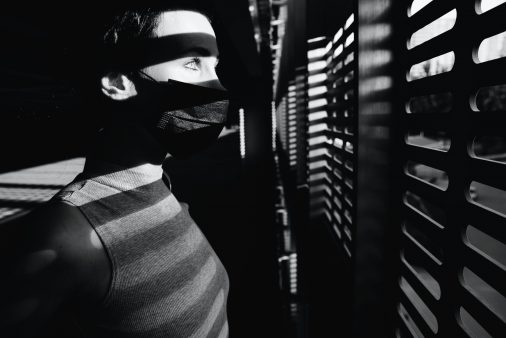‘Not people like us’: the epistemic objectification of the UK’s most vulnerable and why the pandemic is unlikely to change this treatment
13 July 2020
Poverty and human rights abuses in the UK: fear and compassion
“I wash in what I call a birdbath – a little hot water in a basin and have a spruce down. To keep warm I wrap up in layers and layers. I never thought I would be 48 and in this position” (Sharon Morton, welfare claimant speaking at Newcastle Citizens Advice Bureau, 2018).
According to the United Nations, the UK is a nation of citizen human-rights abusers. In the words of the UN Special Rapporteur on extreme poverty and human rights, Philip Alston, on completion of his investigation into UK poverty in 2018 on the 16th November 2018:
“… great misery has […] been inflicted unnecessarily, especially on the working poor, on single mothers […] on people with disabilities […], and on millions of children who are being locked into a cycle of poverty from which most will have great difficulty escaping”
“British compassion for those who are suffering has been replaced by a punitive, mean-spirited, and often callous approach apparently designed […] to impose a rigid order on the lives of those least capable of coping with today’s world”.
But then the recent pandemic caused millions who would otherwise never have experienced food insecurity, poverty, serious health disability, or the challenges of the UK welfare system to get a brief taste of what it might be to be one of those ‘least capable’ of survival in the UK. Would this lead to a restoration of the ‘British Compassion’ Sir Alston found lacking?
Life during Covid-19: salvation and hope for the poorest
The initial seemed to be ‘yes’, as the government announced, “unprecedented measures for unprecedented times”:
“To all those at home right now, anxious about the days ahead, I say this: you will not face this alone […] Now more than at any time in our history, we will be judged by our capacity for compassion […] when this is over – and it will be over – we want to look back on this moment & remember the many small acts of kindness, done by us and to us. We want to look back on this time and remember how we thought first of others and acted with decency.” (Chancellor of the Exchequer Rishi Sunak, 20th March 2020).
Three days after Rishi Sunak’s call for ‘compassion’, the Work and Pensions secretary, Thérèse Coffey, announced that face-to-face interviews and assessments for welfare claims would be suspended for the next three months, along with the same “claimant conditionality” and associated sanctions process (the removal of benefits for failing to carry out prescribed job hunting tasks or to attend meetings in order to continue to receive funds) which the UN investigator had condemned just over a year ago. And this came on the back of furlough funds, mortgage breaks, and a range of other policies, all designed to remove the fear and economic uncertainty a health-frightened nation was facing.
Many hoped or believed that this shared epistemic and lived insight into the experience of material fear, and widespread recognition of the need for compassion and support to get through it, might be the start of a permanent shift in our treatment of those who lived with this reality well before the pandemic. In the words of Guardian commentator, Polly Toynbee:
“Many who see themselves as middle class will confront the reality of Britain’s nonexistent safety net […] These millions discovering DWP brutality at first hand will no longer be deceived by the old poison shaming those on benefits as loafers, frauds and ‘not people like us’” (Toynbee, Guardian, 24th March 2020).
Post-Covid-19: the unchanging epistemic objectification of the poor
My research into the epistemic objectification of welfare claimants, homeless populations and other ‘outsider’ groups, however, has taught me to be sceptical when it comes to the idea that the UK will develop the compassion both Alston and the Chancellor have recently called for when it comes to their appalling treatment of the UK poor. When I read Toynbee’s words, I was sceptical. A few months later, with the recent announcement that, despite continued work-based health risks and the UK government have just announced the re-opening of job centres, and are likely to also be reintroducing sanctions because, “It’s important that as the jobcentres fully reopen this week, we do reinstate the need for having a claimant commitment”, I’m even more sceptical.
The Chancellor did not appeal to economic motives in supporting removals of economic stressors for those affected by the pandemic. He called for ‘compassion’ and ‘kindness’. There was a sense that those experiencing pandemic-related hardship did not deserve the pain they were experiencing and that it was unfair to apply welfare conditions or for the state not to provide support. But what does this then say about those who were already experiencing poverty-related hardship (many of whom experienced worsening threats to their survival during the lockdown), if we are prepared to re-inflict that same stress of “profoundly negative personal, financial, health and behavioural outcomes”, while the pandemic is not yet over, and absent any evidence that it is even effective as a solution to unemployment (not to mention that many of those living in poverty and on welfare pre-pandemic already came from households in which one person was already working)?
Fundamentally, it says that ‘they’ are not included in the realm of people whom Sunak believes history will judge us for not treating compassionately. At least part of this is due to the inability of those living in poverty to be treated as epistemic subjects, in an environment in which pervasive negative identity-prejudicial poverty myths exist.
Miranda Fricker introduces the concept of epistemic objectification, in the context of examining the nature of the way in which people are disbelieved due to systematic prejudice. Gaile Pohlhaus has challenged that interpretation, arguing that the fact that people can be disbelieved at all indicates that they remain subjects, not objects, albeit lesser ones.
But welfare claimants and those living in poverty in the UK are epistemically objectified to a far greater extent than either Fricker or Pohlhaus consider. It is not necessary that a person be “wholly outside the epistemic economy” in order to be epistemically objectified in the sense of not being a part of the community of people whose opinions matter to us. All that is needed is that, first, horribly prejudicial views are widespread about them in society, and second, that they lack the ability to do anything to change those views.
Both of these conditions are met in the case of the UK poor.
UK-based welfare claimants and those with ‘No recourse to public funds’ (NRPFs) have long been stigmatised in British society. Prejudicial negative poverty myths (in the sense of literally ‘not being true’) are widespread. And when newspapers talk about them, it is skewed towards the negative. Social opinions of the UK’s most vulnerable are extremely negative. And the UK’s poorest can do little to change that. The lack of material power that others them, also means that they are not the people writing newspaper editorials, or running the country. When ‘we’ suffer, it is reported as ‘our’ stories. We are the commentators, we are the spokespersons and we are the citizens that governments express their intention to protect. When ‘they’ suffer, newspaper headlines talk about them.
Conclusion
A brief experience of what life is like when the supermarkets are empty and when there are real threats of choices between serious ill health and attempting to work, followed by the state stepping in to help through compassion, will not change the sense that the poor are ‘not people like us’. In fact, all it does is serve to reinforce the perception that the poor are absolutely not epistemic subjects like us, addressees of those messages of support: when ‘we’ suffer, the state calls for compassion and steps in to help us on that basis alone. The fact that the state treats others without compassion, as soon as it is possible for them to practically do so, tells us that those others were never part of the society it was important to speak with or care about in the first place.
To change that, we will need to change the myths that are keeping that distinction in place and then, or simultaneously, find ways to grant epistemic access to the severely financially-excluded. And this will be a much longer-term and more intractable project for those of us who are concerned to undertake it.
Picture: “Black and White Photo of Person Looking at the Window” by Two Dreamers on Pexels
- October 2025
- September 2025
- August 2025
- July 2025
- June 2025
- May 2025
- April 2025
- March 2025
- February 2025
- January 2025
- December 2024
- November 2024
- October 2024
- September 2024
- August 2024
- July 2024
- June 2024
- May 2024
- April 2024
- March 2024
- February 2024
- January 2024
- December 2023
- November 2023
- October 2023
- September 2023
- August 2023
- July 2023
- June 2023
- May 2023
- April 2023
- March 2023
- February 2023
- January 2023
- December 2022
- November 2022
- October 2022
- September 2022
- August 2022
- July 2022
- June 2022
- May 2022
- April 2022
- March 2022
- February 2022
- January 2022
- December 2021
- November 2021
- October 2021
- September 2021
- August 2021
- July 2021
- June 2021
- May 2021
- April 2021
- March 2021
- February 2021
- January 2021
- December 2020
- November 2020
- October 2020
- September 2020
- August 2020
- July 2020
- June 2020
- May 2020
- April 2020
- March 2020
- February 2020
- January 2020
- December 2019
- November 2019
- October 2019
- September 2019
- August 2019
- July 2019
- June 2019
- May 2019
- April 2019
- March 2019
- February 2019
- January 2019
- December 2018
- November 2018
- October 2018
- September 2018
- August 2018
- July 2018
- June 2018
- May 2018
- April 2018
- March 2018
- February 2018
- January 2018
- December 2017
- November 2017
- October 2017
- September 2017
- August 2017
- July 2017
- June 2017
- May 2017

